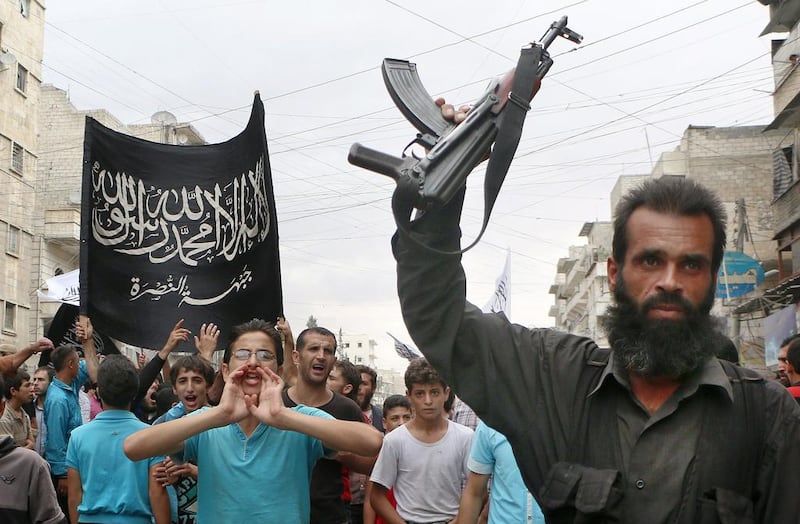AMMAN // Jabhat Al Nusra has gone into hiding in southern Syria, scattering its fighters and moving weapons caches for fear of being hit in a wave of US-led airstrikes.
Commanders of the Al Qaeda affiliated faction in the south have gone underground, believing they have been added to the target list for a coalition of forces that includes the US, the UAE, Jordan, Saudi Arabia, Qatar and Bahrain.
Al Nusra’s northern headquarters, in Aleppo, was bombed on Tuesday, killing up to 50 members of the group.
“Since the [US-led] attacks began Nusra has been scattering its fighters and the ammunition it has been stockpiling over the last months,” said a field commander of a moderate rebel faction involved in operations on Syria’s southern front.
Some Al Nusra members have even shaved their beards and changed their clothes — swapping their emblematic loosefitting black trousers and shirts for jeans and brightly coloured T-shirts — as part of an effort to blend in with the local population and avoid surveillance, according to opposition activists in the area.
“They are frightened, they have been moving out of their strongholds,” the rebel commander said.
Washington and its Arab allies have carried out a series of airstrikes as part of an effort to destroy ISIL, an extremist group that has taken over large areas of north-eastern Syria, as well as western Iraq.
Al Nusra was once part of the ISIL organisation and, although it has now split and the different factions have been at war with each other, both have been deemed a risk to international security by western and Arab capitals. Earlier this month, Al Nusra held 45 Fujian UN peacekeepers hostage. Following their release, and amid ongoing fighting between rebels and forces loyal to president Bashar Al Assad, the UN withdrew its personnel from the area.
Al Nusra believes the UN withdrawal made its fighters more vulnerable to airstrikes that would have been harder to carry out if international troops, policing the Israel-Syria border, were nearby, analysts and rebels watching the southern front said.
Checkpoints manned by Al Nusra in the south-west have been dismantled and buildings used by the group as local headquarters have been evacuated, according to rebels and activists familiar with the area.
Jordan, which borders southern Syria, has been eying this year’s dramatic rise of Al Nusra with alarm and, together with allies from the West and Arab states staffing a secretive Military Operations Command (MOC) centre, has sought to keep it from gaining control of the frontier, while channelling arms and advice to moderate rebel factions.
Amman confirmed its involvement in the air operations against “terrorist groups” — shorthand for ISIL and Al Nusra — on Tuesday.
Top members of Al Nusra in southern Syria are Jordanian, including Sami Al Uraydi, known as Abu Mahmoud Al Shami, of Palestinian origin, considered a religious authority within Al Nusra.
They have been engaged in a shadowy conflict with Amman’s intelligence services, detaining moderate rebels linked to Jordan.
One rebel source said Al Nusra positions in the south had been hit by explosions and gunfire this week, speculating that they were Jordanian military strikes against militants trying to cross from Jordan into Syria. Those claims could not be independently confirmed and were not verified by any other rebel commanders who would be likely to know of attacks.
Nor have they been publicly mentioned either by Al Nusra or the US-led coalition involved in airstrikes in north and eastern Syria.
Southern Syria has become a central plank of Al Nusra’s power, after it was effectively kicked out of eastern Syria by ISIL this summer.
The US-led air offensive against ISIL and Al Nusra’s northern headquarters marks a new departure in Syria’s civil war, a conflict that has killed more than 190,000 people, forced millions to flee their homes and threatened Syria and Iraq with collapse.
What began as a peaceful, pro-democracy uprising in southern Syria in March 2011 has morphed into a brutal, increasingly sectarian war, involving proxy forces from across the region and marked by atrocities, including a deadly poison gas attack by regime forces on rebels last August.
Iran and Russia have supplied the Syrian authorities with weapons, military advisers, fighters and cash, while the West and Gulf states have given rebels trying to topple Al Assad less equivocal support.
As the conflict deepened, ISIL and Al Nusra have expanded, filling a power vacuum and drawing support from outside and inside Syria.
Thousands of volunteer fighters from across Europe, the US, the former Soviet Union and Muslim world are believed to have joined ISIL.
foreign.desk@thenational.ae





